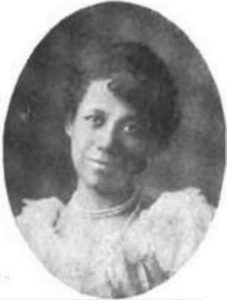
Carrie Williams Clifford
*The birth of Carrie Williams Clifford in 1862 is celebrated on this date. She was a Black writer, editor, and activist.
From Chillicothe, Ohio. Little is known about her childhood, except that she attended high school in Columbus, Ohio, and was a talented student. Before leaving Ohio, she married William H. Clifford, a lawyer and outspoken Republican member of the Ohio State Legislature. In addition to raising her family, Clifford founded the Minerva Reading Club. During the late nineteenth century, this club offered its members an opportunity for social improvement, leadership skill development, and a forum for increased educational opportunity and awareness of racial issues. Poetry readings, musical performances, and oratory contests were all a part of the literary club practice.
Clifford’s writing skills developed as she presented poetry and short stories to her group. This led to her involvement with the National Association of Colored Women (NACW). Then, living in Cleveland, her work and extensive abilities benefited the organization, and in 1901, she founded the Ohio Federation of Colored Women’s Clubs (OFCWC), the first organization of its kind in the nation. As president of the OFCWC, Clifford focused on family, community, women’s rights, and racial issues. She served as editor-in-chief of the women’s edition of the Cleveland Journal and was a contributor to publications, including Alexander’s Magazine. She was part of the OFCWC’s promotion of women’s suffrage and was among the Black and white women participating in demonstrations.
Around 1910, the Cliffords moved with their two young sons to Washington, D.C. With Howard University nearby, Clifford opened her home for literary salons, where Black intellectuals gathered for literary and political discussions. Her guests were Mary Church Terrell, W. E. B. DuBois, Alain Locke, Georgia Douglas Johnson, Charles Chesnutt, and others. When the NAACP was formed in 1910, Clifford was among the prominent women who held leadership roles stemming from her work in the pioneering Niagara Movement.
She contributed articles to the Crisis, the magazine of this organization. Her eloquent essay "Votes for Children" expressed her discontent that women were not allowed to vote. She continued to write poetry, publishing two volumes: Race Rhymes 1911 and The Widening Light 1922. Topics for her poetry included issues of the day: discrimination, injustice, protest, slavery, democracy, and religion. Other topics included famous Blacks such as William S. Braithwaite, Paul Laurence Dunbar, Frederick Douglass, and Phyllis Wheatley; black institutions such as Howard University; and Black Broadway actors.
Clifford also wrote short stories, articles, and poems that appeared in Opportunity, the journal of the National Urban League. Clifford’s writings have been included in a few anthologies focused on black authors. Robert T. Kerlin, who included Clifford’s "An Easter Message" in his Negro Poets and Their Poems (1923), commented that Clifford’s sonnet contained "discord…of the kind that stab you." In the poem’s octave, Clifford crafted "majestic images of spring and renewal, while there she painted a picture of black despair."
Literary scholars, beginning to recognize the contributions of other little-known contributors to the Harlem Renaissance, now include Clifford in their assessment of the period. In Black Women in America, Lorraine Roses acknowledged the significance of Clifford’s work when she described her as "a poet activist whose commentaries on injustice and sufferings specific to women of color (such as sexual harassment and abuse), foreshadowed late twentieth-century protests." Many of the details of Clifford’s life are unknown. She died in 1934, having spent her life as a club woman, writer, women’s rights activist, and civil rights activist. Rosemary Clifford Wilson may have best captured her as "a black woman who lived and spoke and wrote and worked ceaselessly for the rights of all black people."